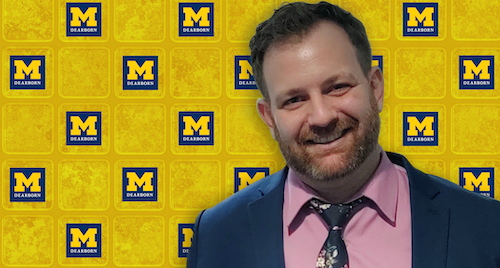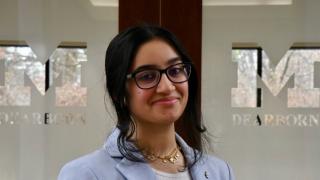On demographics or personal history alone, John Kernan doesn’t fit the profile of an educational reformer. He doesn’t have a story of being pulled into the work via the inequities he experienced because that was never a part of his own life. A white man in his mid-30s, Kernan grew up in a Detroit suburb that’s synonymous locally with affluence. His family and local public school never left him short on anything he needed. Even today, he’s principal at an elementary school not far from where he grew up, serving a student population that he describes as racially and socioeconomically “homogenous.” But chat with Kernan for an hour, and you’ll hear a lot more about equity and justice in education than those pieces of his biography alone would suggest. Just ahead of his official spring graduation from UM-Dearborn’s Ed.D. program, we talked with Kernan about how his education helped him see the world the way he does, and why he thinks building fairness in education requires changing the mindset of those who are better off.
The Reporter: So, first off, congrats on the Ed.D. Only a fraction of educators go on to get a doctorate. How’d you find yourself on that path?
John Kernan: Well, it definitely wasn’t anything I planned for. When you start teaching, there’s that initial incentive to get your master’s because there’s a big pay jump. But when I did the master’s program, I realized just how much I enjoyed looking at things through a more systematic lens. And the Ed.D. program represented a chance to go even deeper with that.
The Reporter: And how would you describe that lens?
John: Well, when you’re training to be a teacher, you’re learning how to be in front of a group of kids and help them learn and grow and progress. But in my graduate education, I was learning to see how policies and social forces funnel down to what’s happening in the classroom. So it really opened my eyes to the bureaucracy and the inequities of education. Like, why, for example, are we struggling with so much in our education system, and a country like Finland doesn’t have the same problems? Well, you start peeling back the layers, and you see the history of our country, from systematic racism to policies and laws that were meant to segregate the rich and poor. And even though we say we’re breaking down those barriers, they’re still there. This coronavirus situation, in fact, puts that on full display. When schools have to go digital, a school district like mine, where you’re working with more affluent families, has a fairly easy time of it. For my cousin who works in Redford, which is a lower-middle class community, the kids are worried about what they’re going to eat.
The Reporter: And for you, it sounds like your education was really pivotal in coming to see things that way.
John: Absolutely. I was lucky enough to come from a family that was able to supply me with what I needed when I needed it, so it was never a thought. One of the things I really appreciate about the Ed.D. program is its diversity. You get to have conversations with people in a setting that’s both intimate and challenging, and it’s a chance to try to see the world the way others see it. One of my colleagues, who’s African American — just the entire makeup of her life was so different than mine, and it helped me understand why she looks at things the way she does. Another colleague — his specialty was criminology and education, and he talked a lot about the connection between poverty, education and the prison system, and how the whole system isn’t set up for people to succeed after they’ve been inside. That was a story he had lived personally, and thankfully, he was one of the exceptions. But once you start looking hard at those systemic inequities — how our society is set up so that once you make a mistake, it’s difficult to recover — it’s really hard to have a simple, idealistic worldview.
The Reporter: I’m curious how you marry that vision for justice that you’re talking about with the position you hold, which you described as being in a well-resourced school district. I mean, right here in the city of Detroit, you have one of the most challenged urban districts in the country and a superintendent in Nikolai Vitti who’s doing some pretty amazing things to turn it around. Does part of you just want to go work for him, or someone like him?
John: Absolutely. In fact, I’ve had chances to talk with him, and the vision he has for the Detroit Public Schools Community District is incredible. I would love to find myself doing that kind of work at some point. The problem I find now is that type of situation demands a level of dedication and time away from my family that’s not in the cards with two little kids. But there is advocacy work you can do no matter where you are. And in fact, I think because of my educational background, one of my responsibilities is to help the community I have influence over see the world through this lens as well. But it’s something I struggle with a lot. Like, how do you help people see a sense of urgency where there is no sense of urgency? Grosse Pointe, where my school is, is kind of in this bubble, and maybe even more so than some other places because it’s a place where mom and dad, grandma and grandpa all went to Grosse Pointe schools. So the bubble is generational, and we’re working with our staff and students constantly to help them see the world outside of their school or their town. I think we’re getting there, whether it's field trips or bringing people in from different backgrounds to talk with the kids, or the ways we pursue a diverse staff through hiring practices. But it’s a challenge that certainly requires a level of persistence and lots of different approaches.
The Reporter: Reading between the lines, I think what I hear you saying is these larger transformational changes that could help a place like Detroit are going to take people in Grosse Pointe getting on board and supporting those changes. Is that more or less where you’re coming from?
John: One hundred percent. The people with power in society have to understand that there is a need before change will happen. And many people in my community still don’t see the need for it, even though it’s there. I mean, we’re going through a reconfiguration where we’re shuttering two elementary schools, and many people want to know why we’re doing this to the kids. But it’s not about that — it’s demographics. It’s about the fact that we don't have enough kids or money to keep those schools open. So if we can’t get our community to understand that, how can we get them to understand challenges in a city that’s not Grosse Pointe? So it’s an extremely complex problem. All I can say is that the more I learn about education, the more engrossed I become in trying to figure out why it’s like this. You can study the history that led us here, but you can’t change history. You can only go forward. But to move forward, in many ways, you have to get people to change their view of history. And if you can figure out how you do that, you let me know.
The Reporter: One last question — can you compare John, the guy who first wanted to become a teacher, with the person you are today?
John: That’s a really interesting question. When I first thought about wanting to become a teacher, I was coaching middle school baseball and I hit a fly ball to a kid in the outfield. He missed it, and it hit his face and kind of blew up his nose. It was pretty traumatic, but seeing him recover and work hard and get his confidence back is what I enjoyed about that experience. When I became a teacher, I found that in the classroom, and that kind of individual success is really what kept me going. Now, while those kinds of individual successes are great, I think about how many more individual successes we’d have if we increased the group success rate. If we can do that, I think then we’re really moving our society forward.




